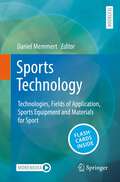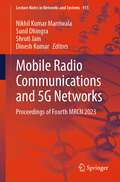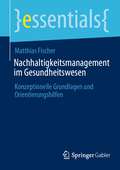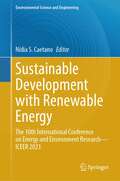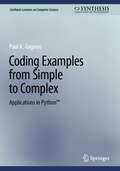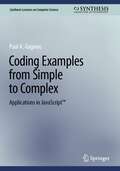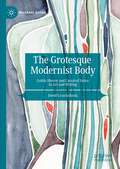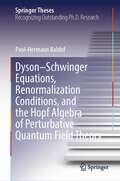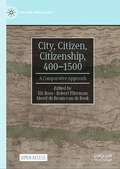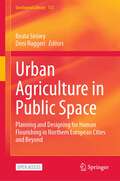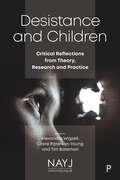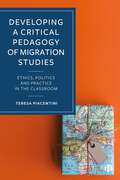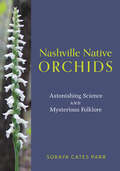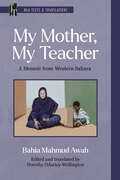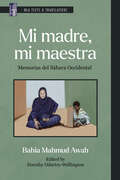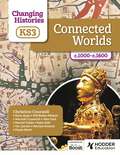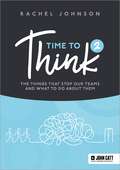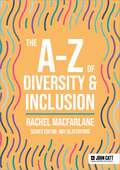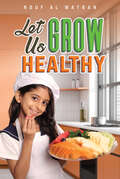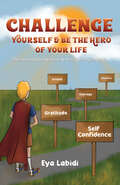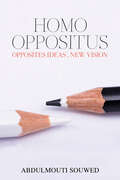- Table View
- List View
Sports Technology: Technologies, Fields of Application, Sports Equipment and Materials for Sport
by Daniel MemmertSports technological tools and innovations are gaining increasing significance in amateur, elite, and health-related sports. Sports technology refers to the application of scientific and technical principles, along with innovative technologies, to enhance athletic performance, increase safety, and consequently optimize the overall sporting experience. This involves the design, development, and utilization of equipment, devices, systems, and software specifically tailored for athletic purposes.This textbook aims to encompass the broad diversity of sports technology by featuring contributions from over 30 authors within their respective specialized fields, summarizing the latest insights concisely. The work is structured into five main sections: Data Acquisition Systems, Sports Equipment and Materials, Diagnostics, Evaluation and Communication, and Selected Fields of Application. Students with a connection to sports science gain a comprehensive understanding of sports technology supported by a carefully designed concept that facilitates easy delivery of learning content. Digital learning cards (SN Flashcards) reinforce the learning effect and ensure optimal exam preparation. For advanced learners, in-depth discussions on topics such as tracking data, digital training assistants, sports floor characteristics, virtual reality in sports, smartphone apps, and diagnostic tools offer additional value.
Mobile Radio Communications and 5G Networks: Proceedings of Fourth MRCN 2023 (Lecture Notes in Networks and Systems #915)
by Dinesh Kumar Shruti Jain Nikhil Kumar Marriwala Sunil DhingraThis book features selected high-quality papers from the Forth International Conference on Mobile Radio Communications and 5G Networks (MRCN 2023), held at University Institute of Engineering and Technology, Kurukshetra University, Kurukshetra, India, during August 25–26, 2023. The book features original papers by active researchers presented at the International Conference on Mobile Radio Communications and 5G Networks. It includes recent advances and upcoming technologies in the field of cellular systems, 2G/2.5G/3G/4G/5G, and beyond, LTE, WiMAX, WMAN, and other emerging broadband wireless networks, WLAN, WPAN, and various home/personal networking technologies, pervasive and wearable computing and networking, small cells and femtocell networks, wireless mesh networks, vehicular wireless networks, cognitive radio networks and their applications, wireless multimedia networks, green wireless networks, standardization of emerging wireless technologies, power management and energy conservation techniques.
Nachhaltigkeitsmanagement im Gesundheitswesen: Konzeptionelle Grundlagen und Orientierungshilfen (essentials)
by Matthias FischerDas Thema Nachhaltigkeitsmanagement gewinnt auch im Gesundheitssektor stark an Bedeutung. Nicht zuletzt, da auf Bundes- und europäischer Ebene neue rechtliche Anforderungen gestellt werden, die auch für viele Organisationen des Gesundheitswesens aktives Handeln in Richtung Nachhaltigkeit und Wahrnehmung der gesellschaftlichen Verantwortung erfordern.Dieses essential bietet Ihnen eine praxisnahe Einführung, durch die Sie sich eine Orientierung im Thema - eben mit spezifischem Fokus auf den Gesundheitsbereich - erarbeiten können. Es möchte bestehende Werke in diesem rasant wachsenden Feld nicht ersetzen, sondern um eine schnelle Orientierungshilfe ergänzen. Sie werden sowohl grundlegende Begrifflichkeiten und theoretische Hintergründe rund um das Thema Nachhaltigkeitsmanagement kennenlernen als auch Hilfestellungen zur Formulierung einer Nachhaltigkeitsstrategie oder zur Nachhaltigkeitsberichterstattung erhalten. Innerhalb kurzer Zeit können Sie sich so zunächst einen grundlegenden Überblick verschaffen und im Anschluss zum Aufbau eines Nachhaltigkeitsmanagements in Ihrer Organisation des Gesundheitswesens beitragen.
Sustainable Development with Renewable Energy: The 10th International Conference on Energy and Environment Research—ICEER 2023 (Environmental Science and Engineering)
by Nídia S. CaetanoThis proceedings book contains the full papers of the 10th edition of the International Conference on Energy and Environment Research, ICEER 2023, that took place in Madrid, Spain during October 7–9, 2023. ICEER 2023 is a joint organization of the School of Engineering (ISEP) of the Polytechnic of Porto (P.Porto) and the SCIEI, with collaboration of the Dipartimento di Ingegneria of the Università degli studi "Roma Tre", CIETI and LEPABE research groups. This book includes all the well prepared full papers presented at ICEER 2023.
Coding Examples from Simple to Complex: Applications in Python™ (Synthesis Lectures on Computer Science)
by Paul A. GagniucThis book provides a comprehensive guide to Python, which stands as the cornerstone of modern programming and is the main computer language driving software prototyping in both industry and research. The author introduces readers to the rich world of Python, taking them on a journey from the fundamentals to advanced topics, equipping them with the knowledge and skills needed to become a proficient Python developer or scientist. The book provides a treasure trove of practical examples, meticulously crafted to deepen the reader understanding of Python. This comprehensive exploration is designed to cater to novice learners as well as mature developers and scientists, equipping them with the requisite knowledge and competencies to harness the Python full potential in their respective projects. From the basics of variable naming and program structure to complex matrix operations, recursion, and object-oriented programming, this book covers it all. This book is part of a seriesof works designed to present both the examples and their explanations in various computer languages, as close to a mirror version as possible.
Coding Examples from Simple to Complex: Applications in JavaScript™ (Synthesis Lectures on Computer Science)
by Paul A. GagniucThis book provides a comprehensive guide to JavaScript, which stands as the cornerstone of modern programming and is the main computer language driving the Internet. The author introduces readers to the rich world of JavaScript, taking them on a journey from the fundamentals to advanced topics, equipping them with the knowledge and skills needed to become a proficient science and engineering oriented JavaScript developer. The book provides a treasure trove of practical examples, meticulously crafted to deepen the reader understanding of JavaScript. This comprehensive exploration is designed to cater to novice learners as well as mature developers and scientists, equipping them with the requisite knowledge and competencies to harness the JavaScript full potential in their respective projects. This book is part of a series of works designed to present both the examples and their explanations in various computer languages, as close to a mirror version as possible.
The Grotesque Modernist Body: Gothic Horror and Carnival Satire in Art and Writing (Palgrave Gothic)
by David CruickshankThe Grotesque Modernist Body explores how and why modernist authors drew on the traditions of the grotesque body in order to represent modern reality accurately. The author employs the concept of the grotesque body as a theoretical framework with which to examine rigorously a range of modernist novels, poems and visual media by Conrad, Lewis, Eliot and Barnes, alongside their historical contexts and theories of humour and horror. This monograph challenges the prevailing narrative of modernism’s abstract, psychological and impersonal ‘inward turn’ by tracing its mechanical-animal hybrid bodies back tothe medieval carnival satire of Rabelais, the gothic horror of the long nineteenth century, from Hoffmann, Shelley and Poe, to H.G. Wells and Henry James, and the uncanny, dreamlike art of Goya and Rousseau.
Dyson–Schwinger Equations, Renormalization Conditions, and the Hopf Algebra of Perturbative Quantum Field Theory (Springer Theses)
by Paul-Hermann BaldufThis book offers a systematic introduction to the Hopf algebra of renormalization in quantum field theory, with a special focus on physical motivation, the role of Dyson–Schwinger equations, and the renormalization group. All necessary physical and mathematical constructions are reviewed and motivated in a self-contained introduction. The main part of the book concerns the interplay between Dyson–Schwinger equations (DSEs) and renormalization conditions. The book is explicit and consistent about whether a statement is true in general or only in particular renormalization schemes or approximations and about the dependence of quantities on regularization parameters or coupling constants. With over 600 references, the original literature is cited whenever possible and the book contains numerous references to other works discussing further details, generalizations, or alternative approaches. There are explicit examples and remarks to make the connection from the scalar fields at hand toQED and QCD. The book is primarily targeted at the mathematically oriented physicist who seeks a systematic conceptual overview of renormalization, Hopf algebra, and DSEs. These may be graduate students entering the field as well as practitioners seeking a self-contained account of the Hopf algebra construction. Conversely, the book also benefits the mathematician who is interested in the physical background of the exciting interplay between Hopf algebra, combinatorics and physics that is renormalization theory today.
City, Citizen, Citizenship, 400–1500: A Comparative Approach (The New Middle Ages)
by Robert Flierman Els Rose Merel de Bruin-van de BeekThis open access book explores how medieval societies conversed about the city and citizen in texts, visual imagery and material culture. It adopts a long-term, interdisciplinary, and cross-cultural perspective, bringing together contributions on the early, high, and later Middle Ages, covering both the medieval East and West, and representing a wide variety of disciplinary angles and sources. The volume is first and foremost about medieval perceptions and their articulation in text, image and material form. The principal focus is not on cities or citizenship per se, but on those who used such concepts, wrote about them, and visualized and depicted them. At the same time, the book seeks to address why the city remained such a salient concept also in non-urban contexts – the periphery, the desert, the monastery – and how medieval thinking on the ideal city and civic community could involve denunciation of the earthly city and its institutional trappings. It thus pushes scholarly boundaries, but also seeks to escape deeply entrenched notions of citizenship as either a form of political participation or legal status.
Urban Agriculture in Public Space: Planning and Designing for Human Flourishing in Northern European Cities and Beyond (GeoJournal Library #132)
by Deni Ruggeri Beata SirowyThis open access book discusses urban agriculture initiatives integrated in public space of dense inner-city neighbourhoods, thereby ensuring its accessibility for large and diverse segments of urban populations. It specifically focuses on the potential impacts of urban agriculture on human well-being (both on individual and community levels), and how planning, design, policy and management practices can maximize these impacts. The book addresses urban agriculture on both a micro and macro scale to facilitate a transition to more sustainable lifestyles and enhance the quality of urban life. It also discusses ways to permanently integrate urban agriculture in existing and planned public spaces in a visually attractive, socially inclusive, and democratic manner to claim and reclaim the right to the city. Based on the research outcomes of the project “Cultivating Public Space: urban agriculture as a basis for human flourishing and sustainability transition in Norwegian cities” funded by the Research Council of Norway, the book emerges from a Norwegian context, but extends to include international urban agriculture cases from the Netherlands, Denmark, the UK and more. By including a diversity of voices and cultural perspectives, the editors aimed to make this book engaging and relevant to an international audience of researchers, policy makers, urban designers, planners, educators, community activists, residents, and public space users of the sustainable, compact city of today and the future.
Desistance and Children: Critical Reflections from Theory, Research and Practice
by Colin Falconer John Wainwright Julie Shaw Martin Stephenson Claire Fitzpatrick Neal Hazel Stephen Case Samantha Burns Jo Staines Kathy Hampson Gilly Sharpe Steve Carr Kirstine Szifris Diana Johns Kevin R Haines Ross Little Katie Hunter Tim Rosier Sean Creaney Andrew Brierley Anne-Marie Douglas Roberta Evans Neema Trivedi-BatemanAvailable open access digitally under CC BY-NC-ND licence. ‘Desistance’ - understanding how people move away from offending – has become a significant policy focus in recent years, with desistance thinking transplanted from the adult to the youth justice system in England and Wales. This book is the first to critique this approach to justice-involved children, many of whom are yet to fully develop an identity (criminal or otherwise) from which to ‘desist’. Featuring voices from academia, policy and practice, this book explores practical approaches to desistance with children in the ‘Child First’ context. It gives new insights into how children can be supported to move away from offending and proposes reforms to make a meaningful difference to children’s lives.
Developing a Critical Pedagogy of Migration Studies: Ethics, Politics and Practice in the Classroom
by Teresa PiacentiniMigration as a taught subject is entrenched in social and political debates, with the classroom firmly framed as a site of committed social and political encounter. That means teaching migration through the prism of critical pedagogy is a political and ethical necessity. This book invites readers to examine their own relationships with migration, ethics, politics and power. It encourages teachers, students and practitioners to think critically about their position in relation to the knowledge they both bring and gain. With pedagogical features that provide space for reflection and discussion, this is a transformative resource in reshaping how we teach and learn about migration.
Nashville Native Orchids: Astonishing Science and Mysterious Folklore
by Soraya Cates ParrHidden in the greenways, parks, and backyards of Nashville are several varieties of stunning native orchids. The vibrant, three-petaled flower has been revered for centuries for its exoticism and inspirational qualities. But these natural treasures, long part of a rich folk tradition, have been largely forgotten by many Nashvillians. This useful guidebook offers a comprehensive look into the secret lives of Davidson County&’s six native orchid species. Alongside vibrant, eye-catching photographs of plant life cycles that provide a straightforward way for readers to quickly identify these varieties, the book offers the fascinating history of these wild wonders as told by author Soraya Cates Parr, a passionate horticulturalist with a knack for explaining the natural world in an accessible way. More than just a useful guide to Nashville&’s flora, Nashville Native Orchids is a reminder of the risk that unbridled urban development can pose to the delicate natural ecosystem. Throughout the book, Parr shows the local effects of climate change on Nashville&’s native orchid population and advocates for a more sustainable approach to development. Beyond the environmental dimensions, this book presents an illuminating discussion of the historical significance of orchids and their central role in folkloric traditions.
My Mother, My Teacher: A Memoir from Western Sahara (MLA Texts and Translations)
by null Bahia Mahmud AwahSeparated from his family in the aftermath of the failed decolonization process in Western Sahara, Bahia Mahmud Awah was sustained by recollections of his mother. In this memoir, he describes her sacrifices, her optimism, and her deep love. His family's experiences exemplify the larger story of loss and displacement in the region even as his story shows how shared memories can nourish community and culture across generations, even in exile. Incorporating poetry in Hassaniya, the traditional Saharawi language, the work highlights the role of language in shaping identity and resisting colonialism.First published in 2011 as La maestra que me enseñó en una tabla de madera (The Woman Who Taught Me on a Wooden Slate), this edition includes the first complete English translation and a new epilogue by the author featuring further remembrances of his mother and examples of her poetry.
Mi madre, mi maestra: Memorias del Sáhara Occidental (MLA Texts and Translations #43)
by null Bahia Mahmud AwahSeparated from his family in the aftermath of the failed decolonization process in Western Sahara, Bahia Mahmud Awah was sustained by recollections of his mother. In this memoir, he describes her sacrifices, her optimism, and her deep love. His family's experiences exemplify the larger story of loss and displacement in the region even as his story shows how shared memories can nourish community and culture across generations, even in exile. Incorporating poetry in Hassaniya, the traditional Saharawi language, the work highlights the role of language in shaping identity and resisting colonialism.First published in 2011 as La maestra que me enseñó en una tabla de madera (The Woman Who Taught Me on a Wooden Slate), this edition includes a new epilogue by the author featuring further remembrances of his mother and examples of her poetry.
Changing Histories for KS3: C.1000c.1600
by Christine Counsell Katie Hall Alex Ford Rachel Foster Tim Jenner Kerry Apps Will Bailey-Watson Hannah Cusworth Nicolas Kinloch Paula WorthChange the history that pupils learn at Key Stage 3. Reframe familiar topics, discover forgotten stories and amplify unheard voices.Through an evocative, story-based approach, this ground-breaking course brings together historical scholarship and enquiry, presenting a truly diverse, inclusive and ambitious history curriculum.This is the history we owe to our pupils. This is the past for today and tomorrow.> Establish a strong foundation of British history. A clear, chronological spine underpins each book, empowering pupils with the knowledge they need to understand, question or disrupt national narratives.> Journey far beyond Britain. Move between local and global, between small details and wider developments, as the books blend depth and overview, expanding pupils' knowledge of people, places and events around the world and the links between them.> Use the power of story to transform your teaching. Captivated by vivid, intriguing narratives, pupils will remember more than they ever have before. See their literacy improve as they encounter a wide vocabulary in context, become immersed in rich, quality texts, and enjoy hearing the book read aloud or reading it themselves.> Teach a diverse curriculum with confidence. Gender, class, race and religion are treated with sensitivity and sophistication, intrinsically woven into the content to create perspective on social, economic, religious and political history.> Stay up to date with historical scholarship. The authors have undertaken extensive reading, so every chapter is informed by current research from historians such as Helen Castor, Ruby Lal and Toby Green.> Deliver the aspirational curriculum that Ofsted expects. The course embodies the requirements for scope, coherence, rigour and sequencing. The Changing Histories curriculum is a progression model. Skills and knowledge are built systematically across each lesson sequence and new material makes sense to pupils because of the content covered earlier.> Trust a meticulously planned approach. Each 'enquiry' chapter helps pupils to shape an extended answer to the overarching question, with carefully paced 'steps' that support pupils in processing substantive knowledge. Shorter 'story summary' chapters keep narratives moving in between the enquiries.> Benefit from some of the best minds in history education. Leaders in history curriculum, practice, research and debate, the authors have poured their expertise into every page, making quality history accessible to all.
Time to Think 2: The things that stop our teams and what to do about them
by Rachel JohnsonBeing a leader involves having followers and working as a team. Sometimes our teams get stuck and issues emerge that we don't always feel equipped to deal with. How do we get buy in, keep momentum, recognise and overcome dysfunction, and get the best out of introverts and extroverts so that everyone feels safe and brave? This book is for people who want to be daring and responsible in their leadership, who want to embrace paradoxes, and understand how to create and maintain thriving teams. Use this book to help you work through the issues that are most relevant to you and your teams so that you, and they, can thrive.
The A-Z of Diversity & Inclusion (John Catt A-Z series)
by Rachel MacfarlaneThe A-Z of Diversity and Inclusion is a powerful blend of advice, reflection and provocation on these vital topics, organised around the 26 letters of the English alphabet.Great educators recognise how diversity enriches their organisation. They have an ambition for every learner (adult and child) to be seen, represented and included, for their needs to be met and any barriers they are experiencing to be understood, tackled and overcome. To achieve this requires dogged determination, relentless and forensic focus and unwavering optimism and energy.Inclusive educators quite literally change lives.
Changing Histories for KS3: C.1000c.1600
by Christine Counsell Katie Hall Alex Ford Rachel Foster Tim Jenner Kerry Apps Will Bailey-Watson Hannah Cusworth Nicolas Kinloch Paula WorthChange the history that pupils learn at Key Stage 3. Reframe familiar topics, discover forgotten stories and amplify unheard voices.Through an evocative, story-based approach, this ground-breaking course brings together historical scholarship and enquiry, presenting a truly diverse, inclusive and ambitious history curriculum.This is the history we owe to our pupils. This is the past for today and tomorrow.> Establish a strong foundation of British history. A clear, chronological spine underpins each book, empowering pupils with the knowledge they need to understand, question or disrupt national narratives.> Journey far beyond Britain. Move between local and global, between small details and wider developments, as the books blend depth and overview, expanding pupils' knowledge of people, places and events around the world and the links between them.> Use the power of story to transform your teaching. Captivated by vivid, intriguing narratives, pupils will remember more than they ever have before. See their literacy improve as they encounter a wide vocabulary in context, become immersed in rich, quality texts, and enjoy hearing the book read aloud or reading it themselves.> Teach a diverse curriculum with confidence. Gender, class, race and religion are treated with sensitivity and sophistication, intrinsically woven into the content to create perspective on social, economic, religious and political history.> Stay up to date with historical scholarship. The authors have undertaken extensive reading, so every chapter is informed by current research from historians such as Helen Castor, Ruby Lal and Toby Green.> Deliver the aspirational curriculum that Ofsted expects. The course embodies the requirements for scope, coherence, rigour and sequencing. The Changing Histories curriculum is a progression model. Skills and knowledge are built systematically across each lesson sequence and new material makes sense to pupils because of the content covered earlier.> Trust a meticulously planned approach. Each 'enquiry' chapter helps pupils to shape an extended answer to the overarching question, with carefully paced 'steps' that support pupils in processing substantive knowledge. Shorter 'story summary' chapters keep narratives moving in between the enquiries.> Benefit from some of the best minds in history education. Leaders in history curriculum, practice, research and debate, the authors have poured their expertise into every page, making quality history accessible to all.
Time to Think 2: The things that stop our teams and what to do about them
by Rachel JohnsonBeing a leader involves having followers and working as a team. Sometimes our teams get stuck and issues emerge that we don't always feel equipped to deal with. How do we get buy in, keep momentum, recognise and overcome dysfunction, and get the best out of introverts and extroverts so that everyone feels safe and brave? This book is for people who want to be daring and responsible in their leadership, who want to embrace paradoxes, and understand how to create and maintain thriving teams. Use this book to help you work through the issues that are most relevant to you and your teams so that you, and they, can thrive.
The A-Z of Diversity & Inclusion (John Catt A-Z series)
by Rachel MacfarlaneThe A-Z of Diversity and Inclusion is a powerful blend of advice, reflection and provocation on these vital topics, organised around the 26 letters of the English alphabet.Great educators recognise how diversity enriches their organisation. They have an ambition for every learner (adult and child) to be seen, represented and included, for their needs to be met and any barriers they are experiencing to be understood, tackled and overcome. To achieve this requires dogged determination, relentless and forensic focus and unwavering optimism and energy.Inclusive educators quite literally change lives.
Death Penalty in Decline?: The Fight against Capital Punishment in the Decades since Furman v. Georgia
by Austin SaratHow have prospects for abolishing the death penalty changed since the 1972 Supreme Court decision, Furman v Georgia? The editor and contributors to Death Penalty in Decline? assess the contemporary death penalty landscape and look at the trends in and attitudes toward capital punishment and its abolition. They highlight factors that are propelling alternatives to the death penalty as well as the obstacles to ending it. At a time when the United States is undertaking an unprecedented national reconsideration of the death penalty, Death Penalty in Decline? seeks to evaluate how abolitionists might succeed today. Contributors: John Bessler, Corinna Barrett Lain, James R. Martel, Linda Ross Meyer, Carol S. Steiker, Jordan M. Steiker, and the editor
Let Us Grow Healthy
by Nouf Al WatbanAre you expecting a baby or want your children to develop healthy eating habits but don’t know where to start? Let Us Grow Healthy is your guide to making better food choices for your family by focusing on wholesome, nutrient-dense foods while limiting unnecessary junk. This book will teach you: · The importance of proper nutrition during pregnancy. · What it means to choose fresh, whole, clean foods. · How to strengthen your child’s immune system through diet. · How to manage food allergies. · The meaning of GMOs and how to avoid them. · The essential vitamins and minerals kids need to thrive. · Why leafy greens and herbs/spices should be diet staples. · Tips for reducing salt and sugar intake. · Ways food can improve brain development and heart health. Let Us Grow Healthy aims to increase your nutrition knowledge with interesting tips and recommendations so you feel empowered to make the best dietary choices for your child’s optimal growth and long-term health. It’s never too early or too late to establish healthy eating habits!
Challenge Yourself & Be the Hero of your Life: Personal Development & Positive Psychology
by Eya LabidiThis book is designed to lay the foundation for a solid and positive upbringing, starting from a child’s first readings and continuing through their teenage years and into adulthood. Written in accessible language, this book engages young readers and captures their attention through independent chapters, each focusing on a specific and fundamental concept. Every section concludes with dynamic, practical exercises related to the notion studied, providing children with valuable advice that is both motivating and challenging enough to help them develop new skills. Among the many treasures within these pages, children will find tools to promote self-expression, personal development, and self-confidence. They will learn how to overcome fears, believe in themselves, unravel emotional blockages, and nurture their natural curiosity. In essence, this book is an exciting adventure where the beloved reader is both the superhero and the heart of its content. By embarking on this journey, children will be well-prepared to face the challenges of growing up, armed with the knowledge and skills necessary to lead fulfilling and successful lives. This book is an invaluable resource for parents and educators who wish to support the positive development of the children in their care.
Homo Oppositus: Opposites Ideas , New Vision
by Abdulmouti SouwedThe core concept of this book is one that resonates with everyone, yet it is explored and presented in a fresh and unique perspective as envisioned by the author. After delving into and discussing this familiar idea, the author arrives at a profound conclusion: that humans embody contradictions within themselves. This introspection leads back to the timeless question: what truly defines a human? In this insightful exploration, the author proposes that humanity is inherently chaotic and self-contradictory. This raises a compelling question in our current era of digital advancement and artificial intelligence: Are we, as a species, still influenced by an ‘archaic mindset’ in this modern age? This book challenges readers to reconsider their understanding of human nature in the context of rapidly evolving technology.
